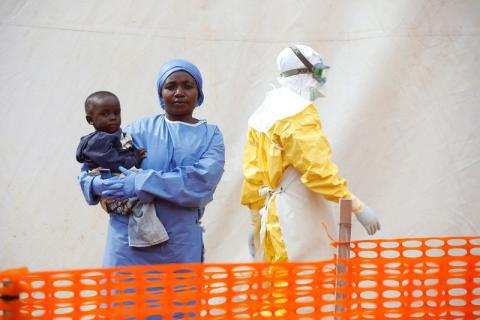Advertisement
U.N. creates new Ebola chief role to tackle security, political issues in Congo
GENEVA (Reuters) - The United Nations named an Emergency Ebola Response Coordinator on Thursday, a new position to boost efforts to contain a 10-month epidemic in the Democratic Republic of Congo that has killed 1,241 people and is spreading.
The drive to rein in the deadly virus has been hampered by attacks on treatment centres by armed groups operating in Congo’s lawless east and by distrust among residents, many of whom view the disease as a conspiracy.
While no major security incidents have occurred in the past week, responders, healthcare workers, and community members are increasingly subjected to threats made against them by armed groups in hotspots such as Katwa and Butembo, the World Health Organization (WHO) said.
"These threats are often disseminated through leaflets or direct intimidation," it said in a weekly update on Thursday night that said there were seven main hotspots where transmission of the virus remains intense.
Fearing violence, some health care workers have been unwilling to wear protective equipment or perform vital infection prevention and control measures, it said.
The outbreak has been contained in parts of Ituri and North Kivu provinces, but risks of spreading to other provinces and neighbouring countries remain "very high", the United Nations and WHO said earlier in a joint statement.
Stronger political engagement and operational support to negotiate access to communities is needed, and readiness planning for Goma, a lakeside city of 1 million people near the Rwandan border, it said.
David Gressly, currently deputy chief of the U.N.'s MONUSCO peacekeeping mission in Congo, has been appointed to the new post, the statement said.
"He will oversee the coordination of international support for the Ebola response and work to ensure that an enabling environment - particularly security and political - is in place to allow the Ebola response to be even more effective," it said.
Gressly, in an interview with the BBC later in the day, said that insecurity and attacks had interrupted case investigations, treatment and vaccinations at times, which allows the virus to "propagate in actually an exponential fashion".
"So it's important that people be secure, responders be secure, and they have the confidence that they can continue to provide support to the victims of the Ebola epidemic," he said.
"Security doesn't have to be armed personnel," he added. "There are many ways of achieving that level of security and the best way is to have the full support of the local population, who can advise of threats very early, who can actually provide some control socially over those kinds of threats."
(Reporting by Stephanie Nebehay; Editing by Raissa Kasolowsky and Grant McCool)



















Add new comment